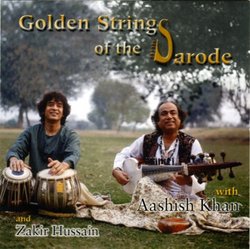| All Artists: Ustad Aashish Khan, Ustad Zakir Hussain Title: Golden String of the Sarode Members Wishing: 1 Total Copies: 0 Label: Moment Original Release Date: 1/1/2005 Re-Release Date: 12/13/2005 Genres: International Music, Pop Styles: India & Pakistan, India Number of Discs: 1 SwapaCD Credits: 1 UPC: 731621102131 |
Search - Ustad Aashish Khan, Ustad Zakir Hussain :: Golden String of the Sarode
 | Ustad Aashish Khan, Ustad Zakir Hussain Golden String of the Sarode Genres: International Music, Pop
For this intimate yet scintillating, Grammy-nominated duet, Aashish Khan, son of the legendary Ali Akbar Khan and a brilliant sarode virtuoso, is heard with percussionist, producer, and composer Zakir Hussain, who has not ... more » |
Larger Image |
CD Details
Synopsis
Amazon.com
For this intimate yet scintillating, Grammy-nominated duet, Aashish Khan, son of the legendary Ali Akbar Khan and a brilliant sarode virtuoso, is heard with percussionist, producer, and composer Zakir Hussain, who has not only taken his ancestral tabla drums into the 21st century, but is a noted classicist with an impressive pedigree of his own. His famous father, Ustad Alla Rakha, working with sitar master Ravi Shankar, was largely responsible for bringing Indian classical music to Western ears during the 1960s. Together, the two younger men explore and expand the perimeters of their respective instruments. Invented in the 17th century, the fearsomely demanding sarode (sarod-dhayak-vina in sanskrit) is made of teak wood with a fretless steel fingerboard, resonating goat skin belly, and 25 metal strings variously employed for drone, rhythm, and melody. The term tabla actually refers to a pair of drums; the smaller dayan is played with the right hand while the larger bayan is played with the left. The three raags that make up the recital are, as is typical of this type of music, are associated with different times of day. Bhimpalashri, meant for the afternoon, is gently but not passively melancholy. Lalita Gouri captures the lingering fires of sunset, while Bhairavi is redolent of fragrant night shadows, romantic longing, and the eternal feminine. --Christina Roden

 Track Listings (3) - Disc #1
Track Listings (3) - Disc #1